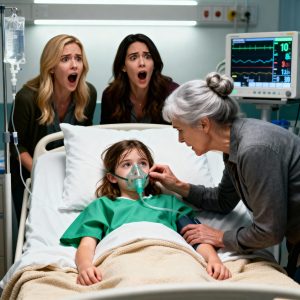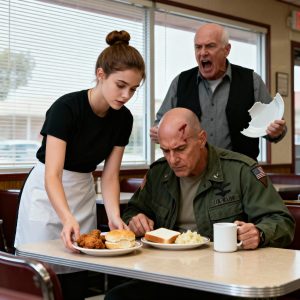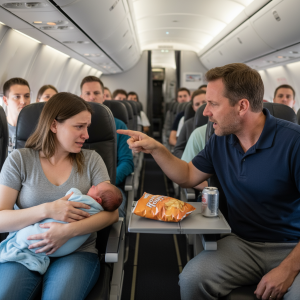The gentle tapping pulled me from sleep—soft as raindrops against glass. Three tentative knocks, then stillness. A breeze slipped through the window gap, pressing the lavender curtains against the wall like an invisible hand on my shoulder. The bedside clock glowed 12:43, its second hand making that barely audible tick that only insomniacs notice.
My daughter Elena had left two days earlier for a business conference. Her parting words echoed: go to bed early, warm up the soup I left, and don’t open the door for strangers after dark. I’d planned to double-check the locks, brew some chamomile tea, and watch the geranium’s shadow creep across the moonlit wall. Instead, my head felt weighted down like I was balancing stones on my skull, and my left hand had that pins-and-needles sensation. At fifty-five, I’d learned that aging brings its own mysterious aches—sounds and sensations only you can detect.
The second knock came harder.
“Mama Carmen…” a muffled voice pressed against the wood.
Miguel.
I rushed to slide back the deadbolt, trying to appear composed. The door swung open to reveal the humid night air and the scent of someone who’d been running hard. Miguel stood there without a shirt, glistening with sweat, his dark hair matted against his forehead, cheeks flushed crimson. The hallway light cascaded down his shoulders like honey. In his grip, he held a worn dish towel—like a white flag of surrender.
“I’m sorry for frightening you, Mama,” he said hoarsely. “Do you have anything for chills? Or… could I possibly borrow an egg? I need to ‘cleanse the bad air’ from my body.”
My breath caught. Each word landed on my ears like hot wax on paper.
“An egg for cleansing?” I echoed, hearing my voice stretch tight as a violin string tuned too high.
He nodded, studying the floor tiles:
“I’m coming down with something. No medicine left in my place. And the eggs… I stored them in the basement freezer but couldn’t face going downstairs. I didn’t want to disturb you, but I remembered how you used to ‘roll the egg’ for my grandfather when he felt poorly.”
I heard fate chuckling in the gaps between the floor tiles. What a scene this would make if anyone knew: son-in-law, half-dressed, past midnight, requesting eggs from his mother-in-law. If Elena discovered this, she’d surely gasp, “Mom, absolutely not!” And if Mrs. Garcia—our gossip-loving neighbor—witnessed this, she’d have material for weeks at the grocery store.
I steadied myself against the doorframe, searching for equilibrium. A thousand thoughts swirled: his work clothes still hanging in the closet smelled of fabric softener; Miguel worked as an emergency room technician, surviving on night shifts and overtime; and I resented those shifts because they pulled him from our dinner table, left Elena clutching her pillow alone, while I imagined sterile corridors reeking of disinfectant and drawn curtains. I also questioned the believability of his request. Yet I remembered another man who’d abandoned me one rainy autumn, and whenever his head felt heavy, he’d plead, “Please roll an egg for me.”
Miguel’s gaze dropped lower.
“If this is inconvenient, I’ll manage. Forgive me…”
“Wait,” I cut him off, afraid that apology would send us both tumbling into an abyss. “Come inside. And wear this.”
I gestured toward a cardigan hanging on the door hook. As he slipped it on, I noticed thin scratches along his left forearm, just before the fabric covered them.
“Took a spill at the street corner,” he explained before I could inquire.
I lit the stovetop on its lowest setting and retrieved my trusty aluminum pot—my vessel for home remedies: fresh ginger, orange peel… and eggs. Once the water bubbled, I lowered two eggs inside.
“One for you, and one as backup,” I said, offering some comfort for this awkward situation.
“Have you eaten dinner?” I asked.
“A sandwich during my shift… then I just wandered around,” he smiled apologetically.
“Why is your face so flushed?”
“Low-grade fever,” he showed me his pulse point.
I was reaching to feel his forehead when flip-flops shuffled in the hallway and Mrs. Garcia cleared her throat. I quickly pulled the kitchen door nearly closed, as if the egg steam might carry our conversation to eager ears.
When the eggs finished cooking, I wrapped them in cheesecloth and gently cracked their shells. Miguel sat upright, waiting like a child before receiving medicine. It amused me: household hierarchies and “proper behavior” remain crystal clear… until someone feels unwell and needs an old remedy.
“Turn around,” I instructed. I bundled the warm egg and rolled it along his backbone. The aroma of hard-boiled eggs mingled with laundry detergent and clean skin.
“Does this hurt?” I whispered.
“Just feels warm,” he murmured. “My grandmother always did this when I was small; she claimed it ‘draws out the bad air.'”
His skin reddened where the egg traveled—what my people called “mal aire” or bad air.
I teased: “Any redder and you’ll smell like a chicken coop.”
He chuckled. I continued rolling across his shoulders and arm, pausing at the scratches.
“How exactly did you fall?”
“Chasing a thief. At the intersection. He grabbed a purse from a woman selling empanadas. I lunged after him… didn’t quite stick the landing.”
“Did you catch him?”
“Got the purse back, yeah. He got away with some scratches.” The lady wept and embraced me… and when I reached my apartment, the chills started,” he recounted as if reading from a neighborhood bulletin board.
The marks looked consistent; I relaxed. I kept rolling and suddenly my left hand felt leaden. My thumb went numb as if pinched by invisible pliers. I concealed my hand within the towel’s edge.
“Turn to face me, please,” I requested, shifting the egg to work on his chest. Something pressed against my throat. Up close, I spotted an old, pale scar across his collarbone. Everyone carries their rings like ancient trees.
Miguel studied me under the kitchen light, eyes gleaming like tiny flames.
“Are you tired, Mama? Is your hand trembling?” he asked in his professional voice.
“Just old age making things shake,” I attempted to joke, hiding the tingling that crept up my arm.
“May I check something?” His demeanor turned serious. “Do you notice the left side of my face drooping? Mouth appearing crooked?”
“Nothing unusual,” I laughed. “Mouth looks perfectly even… perfect for telling lies equally well.”
He didn’t laugh. He moved around the table, filled a glass with water, and brought it to me. I was about to say “I can pour my own”… when my left hand crashed onto the table. The glass rattled and water splashed everywhere. Miguel caught my hand; I watched his expression transform.
“Mama,” he lowered his voice to a tone I’d never heard—deep and commanding. “Give me a big smile.”
I smiled. The right side lifted normally. The left felt like deadweight. I didn’t need a mirror to understand.
“Raise both arms,” he ordered. I lifted my right; the left barely made it halfway before dropping. My heart hammered like a construction worker’s drill. Miguel was already dialing, speaking rapidly:
“Unilateral weakness. Facial drooping. Mama, say a complete sentence.”
“I… I…” My tongue felt like stone.
I realized: the boiled egg had been his excuse to cross a bridge none of us could see.
“Easy now,” he supported me and, with practiced movements, helped me stand. “This appears to be a TIA—a mini-stroke. We’re within the critical window. I’ve called 911.”
His eyes met mine: “Trust me. We need to go.”
I wanted to protest with “It’s nothing, I’ll see a doctor tomorrow.”
But his voice, his steady hand on my shoulder, and a fear as subtle as cigarette smoke made me nod.
While he called for the ambulance, he wrapped a sweater around me, his movements calm, his focus unwavering. I leaned into him. I heard the elevator; Mrs. Garcia peered through her door crack.
“Neighbor, my mother-in-law is having a medical emergency. I’m taking her to the hospital. Could you please watch our stove?” Miguel called out, guiding me into the elevator before I could object.
The courtyard wind sliced across my face. The streetlights looked like watercolors bleeding together. He settled me in the ambulance; he discussed routes and protocols with the paramedic. I only remember his arm around my shoulder and his voice:
“Look at me, stay awake,” and he pressed my phone into my palm, showing me the screen. “Squeeze, release, squeeze…”
In the ER, fluorescent lights blurred everything into whiteness. They wheeled me through doors marked with red crosses. A young physician asked questions, ran tests, then left us for fifteen minutes.
Miguel explained clearly: “symptom onset,” stroke assessment, no injuries, no allergies. I watched him stand solid, shoulders squared, eyes meeting the doctor’s directly. And I saw how they respected his expertise.
The verdict wasn’t devastating:
“Transient ischemic attack,” the doctor announced. “You arrived in time; we’ve administered medication, monitored blood pressure, and ordered additional tests. Excellent early recognition.”
I turned to Miguel. He smiled; for the first time since midnight, his face showed relief rather than fever-flush. I wanted to thank him; my voice had vanished. I could only squeeze his working man’s hand—roughened from pushing gurneys, lifting patients, and wiping worried brows.
Elena arrived at three AM, her blouse wrinkled, hair disheveled, eyes wet with tears. She hugged me, crying and scolding:
“Mom, you terrified me!” She turned to Miguel. “Thank you,” she said with a depth I’d never heard before.
“I never did get that ‘egg,'” he joked, and we all burst into laughter.
They kept me hospitalized for four days. Miguel visited daily: mornings when he dropped Elena off, and evenings after his shifts ended. He’d bring a container of huevos rancheros and grin:
“Today the egg is meant for eating.”
Whenever nurses checked my blood pressure, he’d step aside respectfully, but his eyes never left the monitor readings.
At discharge, the doctor prescribed low sodium, no caffeine, and daily walks. Elena pushed my wheelchair; Miguel walked alongside. Mrs. Garcia waited in our hallway holding fresh mint sprigs.
“Is our neighbor recovering? I… that night I went in to turn off your stove. I could still smell… eggs,” she stumbled over the word.
“Thanks to that ‘egg’ I made it to the hospital,” I winked at her. Her eyes widened and she laughed like fruit dropping from a tree.
At home, Elena organized my medications in a weekly pill organizer; Miguel set phone alarms. I watched them, and the apartment seemed to expand by several feet in every direction. When Elena went to make tea, I quietly asked Miguel:
“Did you really have a fever that night?”
He scratched behind his neck, ears reddening:
“Feverish, yes, but from running… and from anxiety. Elena mentioned your hand had been tingling for days. I told her I’d stop by to ‘check on you,’ but you wouldn’t have let me in if I’d been direct. The egg idea just came to me.”
I laughed, and my chest loosened as if I’d unbuttoned a tight collar.
“Clever strategy.”
“Learned from my grandmother,” he shrugged. “She used to say: adults don’t believe in children’s games, but they readily believe in games they create for themselves.” He pointed to my aluminum pot. “Sorry for the ‘small deception.'”
“It wasn’t deception. It was rescue. And yes… you did ‘draw the bad air’ from me. From all of us.”
A week later, I accompanied him to the market. We stopped at the empanada vendor’s stall near the intersection.
“Young man, this is the boy who rescued my purse.”
The vendor looked up, her weathered eyes filling with tears.
“My son!” she pressed a warm cornbread into his hands. “I couldn’t find you to say thank you properly.”
“I’ll treasure the bread; keep the money so you can keep selling,” Miguel replied.
At home, I taped a note to the refrigerator: FAST—Face, Arms, Speech, Time. Elena added her medication schedules beside it.
Miguel, without announcement, left a basket of twelve brown eggs on the counter.
“For when they’re needed,” he winked. “And for breakfast.”
I stared at that basket and remembered the night when boiled egg aromas masked the scent of fear, his hand on my shoulder, his command to “smile.” I felt like confessing every complaint I’d harbored about his demanding job… and crossing them off one by one. Instead, I said nothing. I washed my pot, polished it until it gleamed, and hung it at eye level—like displaying a treasured memento in the sunlight.
The first night Elena traveled again for work, I went to bed early. At 1:10 AM, gentle knocking. I woke with three jokes ready for Miguel. I opened the door… and found Mrs. Garcia with a water bucket, gasping:
“Neighbor, I’ve got a gas leak and my curtains caught fire!”
I didn’t pause for slippers. Instinctively, I grabbed my pot, filled it with water, and rushed after her. Miguel emerged from the elevator in his uniform, shut off the gas valve, yanked down the burning curtains, and I doused everything with my pot. Steam hissed like oil hitting ice. Mrs. Garcia shook uncontrollably; Miguel gave her sugar water and elevated her feet. I looked at my little pot and thought it had become quite the hero.
Finally, sitting on the floor, Mrs. Garcia said:
“I was frightened for you too when you fell ill. I apologize for occasionally peeking… But if I’d been watching that night, I would have only smelled eggs.”
“Eggs can be lifesavers,” I replied.
“And sometimes they’re medicine,” Miguel added.
“Next time you need eggs at dawn, wear a shirt!” I told him.
“Promise. And… if you ever see someone shirtless knocking, maybe that too will bring help,” he joked; then seriously, lowering his voice: “Mama, I have another unusual request.”
“Another egg?”
“Half egg, half something else.” He showed me an organ donor card. “I want us to discuss this as a family before hospitals force the conversation on us.”
I studied him for a moment. This time, the unusual aspect wasn’t the discomfort, but the window into our future. I took the card; the plastic felt cold, my chest warm.
“Yes,” I said. “Unusual… but necessary.”
I signed. Mrs. Garcia’s eyes widened:
“Oh neighbors, how courageous!”
“Courage means not being afraid,” I answered, and my voice sounded as calm as when you slip an egg into boiling water.
A month later, on my birthday, Elena prepared Mexican-style grilled meats—charcoal, herbs, fresh tortillas. As we blew out candles, Miguel presented me with a small wooden box: inside, a spoon engraved with “peace” on the handle and a piece of photo paper. It showed my aluminum pot, clean and shining on a white cloth, with a short inscription:
“The midnight egg was the excuse for us to recognize each other where blood doesn’t connect us.”
I laughed and cried simultaneously. Elena embraced me; Miguel placed his hand on my back. Outside, vendors called out their wares—empanadas, bread, fresh fruit—everything sounding like music.
Late that evening, I watched Miguel step onto the balcony to call a colleague from the ER: he laughed, listened, then said “I’m coming” with the tone reserved for family. His shirt was properly buttoned. I touched my pot. I thought: if I hear midnight knocking again, perhaps I’ll open the door, whoever it might be. But I hope it’s Miguel, so I can keep the eggs within reach.
And maybe, when Elena’s child is born, I’ll tell them the story of the night when their grandmother was away, but the man who knocked at 12:43 “drew out the evil” from our entire household: not by rolling eggs on our skin, but by uniting us on the same side of a line we hadn’t realized we were crossing.
Some surprises explode like fireworks; others flow quietly like streams beneath stones. That night, our surprise took the shape of an egg. It passed through my kitchen, across the chest of a feverish man, through the trembling hand of a stubborn woman, and left a delicate trail: so that when someone asks “Why did your son-in-law come at dawn requesting eggs?”, I can smile and answer: “To save a face that was already falling and a heart that didn’t know how to see itself clearly.”
And so, this story concludes with a small gift: laughter where I expected tears… and the warm, comforting aroma of a freshly boiled egg.
This story beautifully illustrates how sometimes the most unexpected moments—a midnight knock, a simple request for an egg—can become the bridges that connect us most deeply to the people we love. In our rushing world, it reminds us that healing comes not just from medicine, but from human connection, trust, and the willingness to open our doors to those who need us most.





